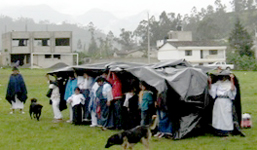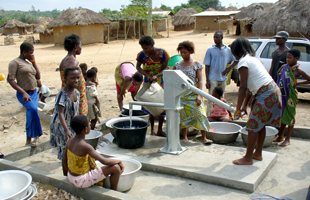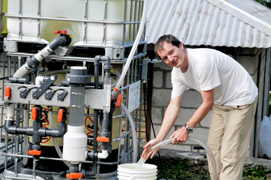(March 22, 2011 - by Ralph Kurtenbach) Two days before World Water Day (Tuesday, March 22) festivities and food accompanied an inauguration celebrating access to clean water at Carabuela in Ecuador's Andean corridor.
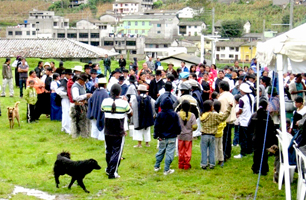 |
| Hundreds gather in Carabuela for water system dedication. |
Communities around joined in, as they too are among 500 families serviced by the water system. Around midday on Sunday, March 20, local residents gathered outdoors under an overcast sky for the ceremony, attended by members of HCJB Global Hands' Clean Water Projects team from the Vozandes Community Development department. Rain drizzled down but the crowd was unfazed, holding large sheets of black plastic to serve as a group umbrella over them.
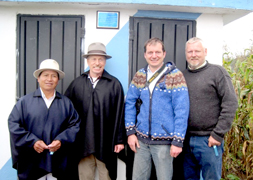 |
| L-R: Segundo Cachihuango, treasurer of the administrative board of the Potable Water Region of Carabuela; Bruce Rydbeck, director of clean water projects; Martin Harrison, director of community development; Hermann Schirmacher, sub-director, Latin America Region. |
As with most of the mission's water endeavors, the Carabuela project serves rural communities where fewer than half of Ecuadorian families have water piped to their homes. In addition, towns and villages are often served by intermittent water systems providing low-quality water, according to Bruce Rydbeck, an HCJB Global engineer who helped design and oversee the community effort to rehabilitate the Carabuela system. He said Ecuadorian government studies indicate that only 13 percent of all rural water systems are considered to be in good condition.
"Each project is a journey of faith in which all of us learn to trust the Lord for guidance," said Rydbeck, who heads the clean water effort for HCJB Global Hands. Any given day will have members of his team communicating with some 10 communities about plans and designs. On in-the-field days, they participate as community members show up with picks and shovels in a tour-de-force that cuts through miles of mountainside for tubing to be laid.
|
|
| Rain fails to dampen enthusiasm at dedication. |
Problems with Carabuela's system came to light a few years ago. A local pastor, Segundo Santacruz, visited with HCJB Global's Ty (a mechanical engineer now directing the Asia Pacific Region), telling him about the community's exorbitant electrical bill of $700 per month for pumping.
Investigating the matter, the clean water projects team was able to help reduce power consumption by supplying water to some homes by gravity. The monthly electric bill has dropped, water use charges were changed and the water is cleaner, although constant monitoring was advised. Unlike most spring-fed remote community systems in the Andes, Carabuela's water system will eventually include chlorine treatment, according to Rydbeck.
Rydbeck said that more than 55,000 Ecuadorians die annually of intestinal parasite infections. Since nearly 90 percent of infectious diseases are waterborne, the maladies are avoidable. More than 90 percent of these deaths can be prevented by the use of a convenient supply of clean water, adequate sanitation and improved hygiene. HCJB Global Hands' response is collaborating with communities throughout Ecuador, facilitating construction or rehabilitation of six projects per year. Many are remote jungle communities only accessible by river canoe or single-engine plane.
Not surprisingly, Rydbeck said, Christians in these communities are strengthened in their faith while others put faith in Jesus Christ for the first time. Churches have started in the process of building a water system.
The mission has carried out this effort since 1980, blending local vision, expertise and sweat equity with funding from individuals, churches, governments and charitable organizations. Expansion in the last several years has spread HCJB Global Hands' clean water work to underserved people elsewhere in the world.
|
|
| Water project in Hateka, Ghana, in 2009. |
In Larty, Ghana, for example, local partner Theovision now offers to the community clean water from a functioning well, according to Jeremy Maller, who says at least a thousand people are benefiting from the well. Describing the well-drilling effort, Sub-Saharan Africa Director Lee Sonius said, "There were a lot of problems with breakdowns, earth caving in, etc. It took months to put it in, but it was finalized (in 2010)."
The world's disaster zones demand clean water too, according to Sheila Leech, HCJB Global's vice president of international healthcare. She said the mission shipped 80 Sawyer water filters to Pakistan following the heavy flooding last year and "they were used for families who were severely affected."
|
|
| Martin Harrison with water water purification unit in Haiti provided by Water Missions International. |
Sources: HCJB Global, Centers for Disease Control and Prevention
Photo credits: Ralph Kurtenbach, Hermann Schirmacher

